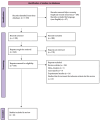The Role of Gut Microbiota in Pediatric Obesity and Metabolic Disorders: Insights from a Comprehensive Review
- PMID: 40507152
- PMCID: PMC12158192
- DOI: 10.3390/nu17111883
The Role of Gut Microbiota in Pediatric Obesity and Metabolic Disorders: Insights from a Comprehensive Review
Abstract
Background: Pediatric obesity represents a multifactorial condition in which gut microbiota dysbiosis, low-grade systemic inflammation, and metabolic dysfunction are intricately connected. Objectives: This systematic review sought to evaluate and integrate current findings regarding the interactions between gut microbial composition, dietary influences, inflammatory status, and metabolic outcomes in obese pediatric populations. Methods: A comprehensive search of PubMed, Scopus, and Web of Science databases was conducted for studies published from January 2010 onward. Eligible studies comprised randomized controlled trials, and cohort, cross-sectional, and longitudinal designs involving individuals aged ≤18 years. Study quality was appraised using the NIH Study Quality Assessment Tool. Results: Sixteen studies fulfilled the inclusion criteria. Dysbiosis was consistently observed among obese children, characterized by alterations in microbial diversity and abundance associated with increased inflammation and adverse metabolic profiles. Dietary interventions, notably symbiotic supplementation and adherence to Mediterranean diet patterns, were associated with favorable modulation of gut microbiota and inflammatory parameters. The majority of studies demonstrated high methodological quality, although minor observational limitations were noted. Conclusions: Gut microbiota dysregulation plays a central role in the development of metabolic and inflammatory complications associated with pediatric obesity. Although dietary and microbiota-modifying strategies show therapeutic promise, their effectiveness must be substantiated through robust, long-term studies.
Keywords: dietary interventions; gut microbial composition; inflammatory and metabolic outcomes; microbiota-modifying strategies; pediatric obesity.
Conflict of interest statement
The authors declare no conflicts of interest.
Figures

Similar articles
-
Small Intestinal Bacterial Overgrowth and Pediatric Obesity-A Systematic Review.Nutrients. 2025 Apr 29;17(9):1499. doi: 10.3390/nu17091499. Nutrients. 2025. PMID: 40362809 Free PMC article.
-
Beneficial effects of ginger on prevention of obesity through Modulation of gut microbiota.J Health Popul Nutr. 2025 Jun 15;44(1):200. doi: 10.1186/s41043-025-00953-9. J Health Popul Nutr. 2025. PMID: 40518517 Free PMC article. Review.
-
Integrating Gut Microbiome and Metabolomics with Magnetic Resonance Enterography to Advance Bowel Damage Prediction in Crohn's Disease.J Inflamm Res. 2025 Jun 11;18:7631-7649. doi: 10.2147/JIR.S524671. eCollection 2025. J Inflamm Res. 2025. PMID: 40535353 Free PMC article.
-
The impact of a western diet on gut microbiota and circadian rhythm: A comprehensive systematic review of in vivo preclinical evidence.Life Sci. 2024 Jul 15;349:122741. doi: 10.1016/j.lfs.2024.122741. Epub 2024 May 22. Life Sci. 2024. PMID: 38788974
-
Exploring Metabolic Signatures: Unraveling the Association with Obesity in Children and Adolescents.Nutrients. 2025 May 28;17(11):1833. doi: 10.3390/nu17111833. Nutrients. 2025. PMID: 40507103 Free PMC article. Review.
References
Publication types
MeSH terms
LinkOut - more resources
Full Text Sources
Medical

